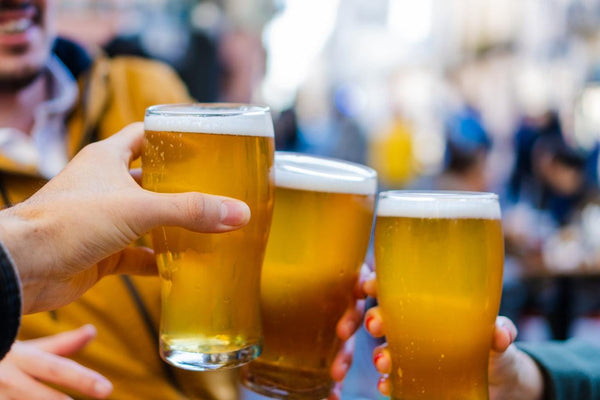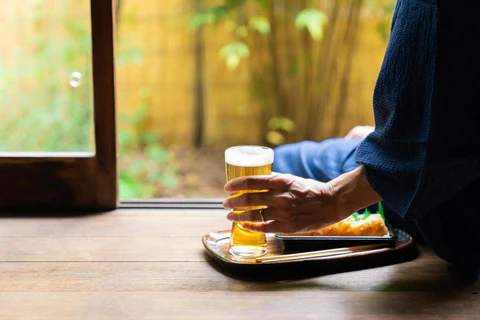
Jump to:
If you have ever experienced the sweltering heat of Japanese summers, you will no doubt have felt the allure of the bustling beer gardens and the beer on tap served at its vibrant summer festivals. Beer in Japan, however, is not just a summer indulgence and is popular in all seasons. Although Nihonshu (commonly known as “sake”) remains the most widely consumed alcoholic beverage in Japan, beer consumption has been increasing steadily in recent years, especially among young people.
In this post, we shall examine the characteristics of Japanese beer in general and how it stands apart from beer in other countries, compare beer with other beer-like beverages, consider some different Japanese beer brands, including major breweries and regional/craft breweries, and look at where you can purchase beer, not forgetting, of course, the snacks that go with them.
Characteristics Of Japanese Beer

Japanese beer has both similarities and differences when compared with other beers around the world. The fundamental ingredients are the same as those used throughout the world: water, malted barley, hops, and yeast. The brewing practices are also consistent with those used globally: mashing, boiling, fermenting, conditioning, and packaging.
There are, however, some key differences. Some Japanese manufacturers add rice as an ingredient instead of grain. This lowers the malt content of the beer and gives it a lighter, crisper taste. You can also find some beers with additional funky ingredients, such as yuzu (a tart citrus fruit), Sansho (a type of Japanese pepper), Matcha green tea, and cherry blossom leaves.
Japanese beer also typically has more foam (or “head”) than beers found in other countries. In a U.K pub, a customer may consider themselves short-changed if they are given a large head as it means less actual beer, but in Japan, a generous serving of foam is intentionally created by the server as it is considered to improve the taste and appearance of the beer and prevent carbon fizz and loss of flavor when it comes into contact with oxygen.
Japanese beer typically has an ABV (alcohol per volume) of approximately 4-5%. Lagers are still the most prevalent type of beer in Japan, but the country also has a burgeoning craft beer movement, and one can also find a variety of stouts, pale ales, wheat beers, and seasonal beers, to name just a few. Also popular in Japan are so-called “half-and-half” beers, combining a lighter beer such as a pale lager with a darker beer such as a stout, which provide a unique taste profile and visual appeal.
When Is Japanese Beer Not Beer?

The answer to this is riddle is “when it is Happoshu.” Happoshu was developed in the 1980s as a low-cost alternative to beer. Although it uses the same primary ingredients as beer, for it to be legally classified as beer in Japan, a specific quantity of malt must be used.
In the case of Happoshu, at least some of the malt is substituted for cheaper ingredients such as grains and sugars. Not only are the ingredients cheaper, but the lower malt content puts Happoshu in a different tax bracket to beer, and so less tax is charged. The AVB of Happoshu also tends to be slightly lower and as there is less malt included, it is generally lighter in taste and lacks the deep taste and flavor of beer. Although, for this reason, it tends to be shunned by many beer afficionados, Happoshu remains popular among budget-conscious consumers.
Major Japanese Beer Brands
In this section, we shall provide an introduction to the different brands of beer, starting with the “big four” major breweries, before looking at some regional-based and craft breweries.
Asahi Breweries

Established in 1889, Asahi Breweries, with a 36.5% share of the market, is the most popular beer in Japan (as of 2023). Also gaining in popularity abroad, Asahi beer is crisp and refreshing with a smooth texture and clean finish. Its flagship product is “Asahi Super Dry”, which hit the market in 1987, and is characterized by its crisp, dry taste and refreshing finish. Its head office is located in the Tsukiji area of Tokyo.
Kirin Brewery Company

Founded in 1907, the Kirin Brewery Company, as of 2023, held an approximate 35% share of the Japanese beer market (marginally second only to Asahi). Kirin beer is loved for its balanced taste with subtle malt sweetness and a crisp, clean finish, and its aroma reminiscent of grains and hops. One of its most popular products is “Kirin Ichiban Shibori”, which is brewed in a way that utilizes only the first press of the wort, the liquid extracted when mashing the grains.
Suntory Beer

With an approximate 16% share of the beer market in 2023, Suntory has the third largest share in Japan. Established in 1899, the company has successfully sold a range of beers, whiskeys, and soft drinks. The most prominent of its array of beers is its flagship product, “The Premium Malts”, which has a balanced flavor and clean and dry finish that leaves a pleasant aftertaste. Its most popular offering, however, is Kinmugi, which is actually classed as a Happoshu. Its brewery can be found in Musashino City, located West of the 23 special wards of Tokyo.
Sapporo Beer

With the smallest share of the four major beer brands at around 12%, Sapporo Beer was first brewed in Sapporo, Hokkaido, in 1876, and, with a smooth, crisp, flavor and refreshing finish is loved by its enthusiasts for the distinctive taste profile produced by its traditional production methods. Although headquartered in Tokyo, its major brewery is located in neighboring Chiba Prefecture. Sapporo is famous for its Premium and Black Label brands, as well as Yebisu beer, which is more up-market and characterized by its rich and complex flavor.
Regional & Craft Japanese Beer Brands
While the aforementioned four major brands have close to a 99% share of the beer market in Japan, also attracting a loyal following are various regional and craft beers, some of which will be introduced below.
Orion Breweries

Orion Breweries was established in Okinawa in 1957, during the time of the U.S. administration after World War II, and the light and crisp taste of its beers, such as its flagship lager reflect the initial desire of the company to market beer that would appeal to American tastes.
Swan Lake Beer

Brewed in Niigata Prefecture, in the north of Honshu island, this company, founded in 1997, is boldly producing a range of German-style lagers, Belgian-style ales, and IPA (India Pale Ale), as well as stouts and seasonal craft brews.
Yo-Ho Brewing Company

Founded in 1996, in Nagano Prefecture, the Yo-Ho brewing company is located in Nagano Prefecture and utilizes the rich natural environment and high-quality water sources to produce highly flavorful craft beers, such as pale ales, IPAs, stouts, and lagers using traditional brewing techniques.
The Far Yeast Brewing Company

The Far Yeast Brewing Company was established a little over a decade ago, with its headquarters in Tokyo. Its main brewing facility, however, utilizes the high-quality water sources and rich natural environment of Kosuge Village in Yamanashi Prefecture. It offers a range of interesting beers, including KAGUA Rouge, which is a Belgian-style ale, in which Yuzu and Sansho are also included in the brewing process.
Shiga Kogen Beer

The Shiga Kogen Beer company was only founded in 2004 but is a part of a family-owned sake brewery that dates back to 1805. This rich brewing heritage has led to the beer company attracting a broad base of enthusiasts both in Japan and around the world. As its name suggests, it is based in the beautiful natural environment of Shiga Kogen in Nagano Prefecture, which is renowned for its high-quality water sources. Its wide range of beers includes Porter, which is a dark beer with flavors of chocolate, coffee, and roasted malt.
Yokohama Beer Company
Founded in 1999 with sustainability as a key aspect of its brewing philosophy, the Yokohama Beer Company is known for its high-quality and innovative craft beers, which it produces using locally sourced ingredients. The brewery is deeply integrated into the community, participating in local events and collaborations. Their restaurant, UMAYA, also offers freshly brewed beers, and it has earned numerous awards, including a silver medal at the 2024 World Beer Cup. It also engages in tourism and education, providing tours and promoting appreciation of craft beer in general.

Rokko Beer
Rokko Beer, also known as Rokko Brewery, is located in Kobe, near the Arima Onsen and was established in 1997. The unique taste of its beers is provided by the natural spring water from the Rokko Mountains used by the brewery. It offers a variety of craft beers, including Rokko Pilsner, IPA, Porter, and Barley, all made with 100% malt. Rokko Beer has won several awards for its quality and frequently releases limited-edition brews. The brewery is active in local events and collaborations and operates tasting rooms for visitors to enjoy their refreshing beers.

Otaru Beer
Otaru Beer, established in 1995 in Otaru, Hokkaido, is a renowned craft brewery known for its traditional German brewing methods and adherence to the Reinheitsgebot purity law (a law dating from 1516, which mandates that beer be made only with water, barley, hops, and later, yeast.) They use high-quality ingredients, including locally sourced water, to produce classic beers like Otaru Pilsner, Dunkel, and Weiss, as well as seasonal specialties. The brewery features a popular beer hall offering freshly brewed beers paired with German-style cuisine. Engaged in the local community, Otaru Beer participates in events and offers educational brewery tours, and has received numerous awards for its dedication to quality and authenticity in brewing.

Purchasing Japanese Beer
You never have far to look if you want to purchase beer in Japan. If you want to enjoy a refreshing glass while out, it is served in many restaurants, bars, beer halls, and beer gardens, as well as being readily available on tap at festivals. Although decreasing in number due to social concerns and stricter regulation, you can still find outdoor vending machines in Japan that sell beer - something that would be unthinkable in many countries.
If you prefer to drink beer at home, you can get it at many supermarkets, convenience stores, as well as the local Sakaya (traditional Japanese liquor stores). There is even an alcohol corner in some large electronics stores.
If you are purchasing in large amounts, such as by the case, however, buying online may be the most practical option, and if you prefer your beer to be of the non-alcoholic variety, the Japanese Taste website has some great options, such as Suntory All-Free Non Alcoholic beer, which prides itself on being not only alcohol-free, but also free of calories, and also purines, which is good news for those suffering with gout or prone to kidney stones. Asahi also offers a non-alcoholic beer called Asahi Dry Zero Non Alcoholic Beer. Asahi has given this beer, which is sugar-free, a creamy “head”, aiming for a taste as close to regular beer as possible. Their success in doing this is reflected in the fact that this brand is the best-selling beer of its type.
Some Snacks With Your Beer?

Drinking alcohol can increase your appetite due to what is known as the “aperitif effect”. There are many explanations for this, but it is generally believed to be its effect of inhibiting leptin, a hormone that signals satiety, and increasing ghrelin, a hormone that stimulates hunger. Another contributing effect could be the effect of alcohol on the brain, in areas related to reward and pleasure.
Whatever the reason, many of us finding ourselves reaching for snacks when enjoying beer, and in this regard too, the Japanese Taste website has you covered. If nuts are your thing, these Jumbo Orion Beer Snack Nuts were designed to have the exact amount of flavor to accentuate the taste of the beer without overpowering it. Enjoy three different tastes from Okinawa: tacos island pepper, turmeric curry, and almond cheese.
Talking of cheese, if you enjoy cheese and crackers with beer, this pack of 10 Gilco Cheeza Cheddar Cheese crackers may be the ones for you. They also come in Camembert flavor and there is even a low-carb black pepper version. For an extra treat, you could pair them with these pepper bacon snacks, also from Gilco.
If drinking beer gives you more of a yearning for seafood, these dried scallops from Hokkaido make a perfect accompaniment to your evening tipple. As scallops are rich in protein, as well as Vitamin B12, minerals, and omega-3 they can be definitely considered one of the healthier beer snacks.
The World Of Japanese Beer
As discussed in this article, Japanese beer, while produced in a similar way to other beers, has several distinct characteristics such as the use of rice as, as well, at times of more exotic ingredients. It is also brewed in a way that ensures a generous amount of foam is produced on top of the beer.
Although the Japanese beer industry is still dominated by the "big four"—Asahi, Kirin, Suntory, and Sapporo—a growing number of regional and craft breweries have emerged, adding further color and variety to the landscape of Japanese beer.
Are you a fan of Japanese beer? If so, which is your favorite and why? Let us know in the comments.


4 comments
Hi Jeremy,
Same here! Asahi is definitely a go-to beer in Japan. Otaru, Sapporo, and Kirin are all fantastic choices too! Kobe has some amazing restaurants, perfect for pairing with, of course, Kobe beef! Osaka has plenty of pet cafes to check out as well. We hope you get to visit soon!
Cheers,
Japanese Taste,
i would love an Asahi right now ! , but also an Otaru, Sapporo and kirin, or to visit Kobe, and japan , even try the cafes with the dogs !
Jeremy,
Hi David,
I agree! Yebisu beer is truly exceptional! Its rich flavor comes from the extra malt used in brewing, which requires a longer aging process.
Cheers!
Japanese Taste,
Yebisu beer is excellent in my opinion.
David Harris ,